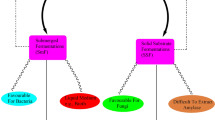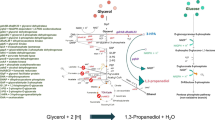In an attempt to clarify the function of l-aspartic acid and culture conditions in aspartate ammonia lyase induction, experiments were carried out on aspartase formation in Bacillus cereus cells. The enzyme was produced by microorganisms in response to l-aspartic acid, which is catabolized by direct deamination to fumarate. Enzyme synthesis by B. cereus was associated with physiological growth stages, which was confirmed by use of the protein synthesis inhibitor, chloramphenicol, whereas it did not influence synthesis when it was added directly to the reactor batch containing a biotransformation system. Aspartase activity was evaluated in a batch reactor by biotransformation of fumaric acid into l-aspartic acid catalyzed by whole B. cereus cells. The culture medium for the strain was optimized, which increased the initial aspartase activity threefold. B. cereus cells showed optimal aspartase activity at late log phase. Journal of Industrial Microbiology & Biotechnology (2000) 25, 225–228.
Similar content being viewed by others
Author information
Authors and Affiliations
Additional information
Received 02 December 1999/ Accepted in revised form 09 August 2000
Rights and permissions
About this article
Cite this article
Garza, Y., Rodríguez, M., Hernández, C. et al. Optimization of aspartate ammonia lyase production by Bacillus cereus . J Ind Microbiol Biotech 25, 225–228 (2000). https://doi.org/10.1038/sj.jim.7000060
Issue Date:
DOI: https://doi.org/10.1038/sj.jim.7000060




